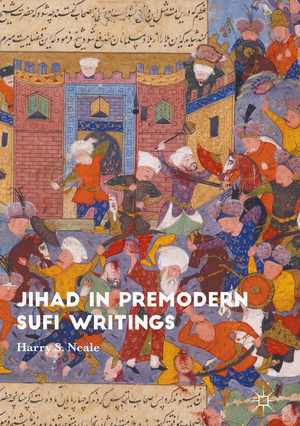Jihad in Premodern Sufi Writings
Autor Harry S Nealeen Limba Engleză Hardback – 2 dec 2016
This book is the only comprehensive study in a European language that analyzes how Sufi treatises, Qur’anic commentary, letters, hagiography, and poetry define and depict jihad. Harry S. Neale analyzes Sufi jihad discourse in Arabic and Persian texts composed between the eleventh and seventeenth centuries, providing access to many writings that have hitherto been unavailable in English. Despite the diversity of practice within Sufism that existed throughout the premodern period, Sufi writings consistently promulgated a complementary understanding of jihad as both a spiritual and military endeavor. Neale discusses the disparity between contemporary academic Sufi jihad discourse in European languages, which generally presents Sufis as peaceful mystics, and contemporary academic writing in Arabic that depicts Sufis as exemplary warriors who combine spiritual discipline with martial zeal. The book concludes that historically, Sufi writings never espoused a purely spiritual interpretation of the doctrine of jihad.
| Toate formatele și edițiile | Preț | Express |
|---|---|---|
| Paperback (1) | 379.86 lei 6-8 săpt. | |
| Palgrave Macmillan US – 28 apr 2018 | 379.86 lei 6-8 săpt. | |
| Hardback (1) | 582.80 lei 6-8 săpt. | |
| Palgrave Macmillan US – 2 dec 2016 | 582.80 lei 6-8 săpt. |
Preț: 582.80 lei
Preț vechi: 685.65 lei
-15% Nou
Puncte Express: 874
Preț estimativ în valută:
111.53€ • 115.78$ • 92.100£
111.53€ • 115.78$ • 92.100£
Carte tipărită la comandă
Livrare economică 22 martie-05 aprilie
Preluare comenzi: 021 569.72.76
Specificații
ISBN-13: 9781137567482
ISBN-10: 1137567481
Pagini: 169
Ilustrații: XII, 168 p.
Dimensiuni: 148 x 210 mm
Greutate: 0.39 kg
Ediția:1st ed. 2017
Editura: Palgrave Macmillan US
Colecția Palgrave Macmillan
Locul publicării:New York, United States
ISBN-10: 1137567481
Pagini: 169
Ilustrații: XII, 168 p.
Dimensiuni: 148 x 210 mm
Greutate: 0.39 kg
Ediția:1st ed. 2017
Editura: Palgrave Macmillan US
Colecția Palgrave Macmillan
Locul publicării:New York, United States
Cuprins
Introduction.- Chapter One: Overview of the History of Sufi Studies.- Chapter Two: Islamic Scripture and the Doctrine of Jihad.- Chapter Three: The Concept of Spiritual Jihad in Learned Sufi Texts.- Chapter Four: The Martial Jihad in Learned Sufi Texts.- Chapter Five: Representations of Jihad in Sufi Hagiography and Poetry.- Chapter Six: Historical Role of Sufis in Military Endeavors.- Conclusion.
Notă biografică
Harry S. Neale holds a Ph.D. in Near Eastern Studies from the University of California, Berkeley, and an M.A. in Near Eastern Studies from the University of Arizona. He has taught courses on Islamic Humanities, Early Islamic History, Middle Eastern literature, Elementary and Intermediate Arabic, and Elementary Persian at UC Berkeley, Lehigh University, and the United States Military Academy at West Point. He has published articles in the Journal of Arabic Literature, Journal of Indo-European Studies, and Middle Eastern Literatures.
Textul de pe ultima copertă
This book is the only comprehensive study in a European language that analyzes how Sufi treatises, Qur’anic commentary, letters, hagiography, and poetry define and depict jihad. Harry S. Neale analyzes Sufi jihad discourse in Arabic and Persian texts composed between the eleventh and seventeenth centuries, providing access to many writings that have hitherto been unavailable in English. Despite the diversity of practice within Sufism that existed throughout the premodern period, Sufi writings consistently promulgated a complementary understanding of jihad as both a spiritual and military endeavor. Neale discusses the disparity between contemporary academic Sufi jihad discourse in European languages, which generally presents Sufis as peaceful mystics, and contemporary academic writing in Arabic that depicts Sufis as exemplary warriors who combine spiritual discipline with martial zeal. The book concludes that historically, Sufi writings never espoused a purely spiritual interpretation of the doctrine of jihad.
Caracteristici
Explores the complementary nature of jihad as both a spiritual and military endeavor in Sufi writings Analyzes Arabic and Persian Sufi writings from the eleventh through the seventeenth centuries Demonstrates that historically, Sufi writings never espoused a purely peaceful understanding of the doctrine of jihad
